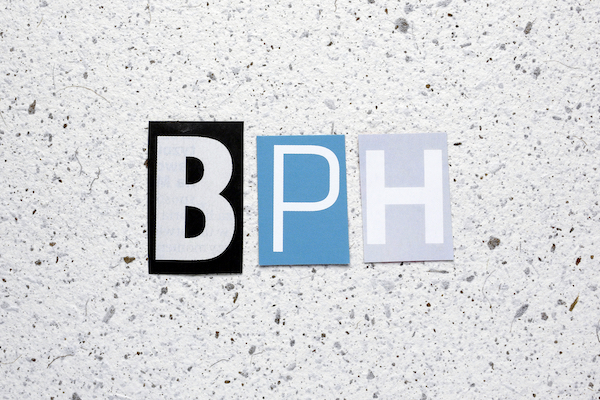
Does your man get up every few hours at night to pee? Are the two of you losing quality sleep because of these interruptions every night? Do you need to curtail your activities in and out of the bedroom because of his need to urinate so often? If this sounds familiar and you would like to help your man (and you) sleep better and improve your quality of life, nature may have a solution for both of you.
Have you heard of BPH?
Among men age 40 or older, a condition called BPH, or benign prostatic hyperplasia, is common. In fact, about 50 percent of men age 51 to 60 and up to 90 percent of men older than 80 have BPH. Benign prostatic hyperplasia is a noncancerous condition in which the prostate gland begins to enlarge. This causes it to press against the urethra, which is the tube that transports urine, and the bladder.
Read about a healthy prostate: it’s a must for every man
The pressure can cause a variety of symptoms, including the need to urinate often, especially during the night, as well as experience an urgent need to urinate, pain when urinating, difficulty starting and stopping when urinating, a weak stream, and dribbling. Some men also sleepwalk.
It’s important to mention that these symptoms may also be an indication of other problems with the prostate, including prostatitis and prostate cancer. Urinary tract infections, kidney or bladder stones, and problems with nerves that involve the bladder also can cause similar symptoms. Therefore, it’s essential for men to consult with their healthcare provider and have an examination to get a diagnosis.
Managing BPH
Doctors often prescribe certain medications to treat the symptoms of BPH. These can include drugs designed to stop the growth of or shrink the prostate, as well as reduce symptoms. Alpha-blockers, phosphodiesterase-5 inhibitors, and 5-alpha reductase inhibitors fall into this category. These medications are associated with various side effects, including but not limited to dizziness, fainting, headaches, low libido, erectile dysfunction, low blood pressure, back pain, stuffy nose, and vision problems.
A variety of natural supplements have been shown scientifically to be effective as well. For example:
Saw palmetto
Dozens of studies have looked at the effect of the berries from this dwarf palm tree on enlarged prostate. Saw palmetto may reduce inflammation and act on hormones to provide symptom relief.
For example, a 2019 study of more than 350 men with BPH compared the use of saw palmetto with placebo. The men who took saw palmetto experienced significant improvement in symptoms compared with those who took the placebo.
Rye flower pollen
Some research indicates that the use of rye flower pollen may be effective in reducing the need to urinate often during the night and in urgency experienced during the day. One review looked at the results of four studies involving 444 men. The authors concluded that rye flower pollen was well tolerated and was associated with a modest improvement in symptoms.
Lycopene
This potent antioxidant is found mainly in tomatoes and tomato products, such as soups and sauces. It has a reputation as being a friend of the prostate, including an enlarged one. Lycopene, along with the mineral selenium and saw palmetto, was named as a substance that can reduce inflammation in the prostate and help improve symptoms and urinary flow in men with BPH.
Read about lycopene may lower blood pressure
Zinc
The mineral zinc is present in high levels in the prostate, which suggests it plays a significant role in its health and function. In a recent study from Italy, the scientists noted that zinc is a “protective factor for benign prostatic hyperplasia.”
Plant sterols
Generally, free plant sterols attach to the prostate gland and help reduce inflammation. Among the plant sterols that may help BPH is beta-sitosterol, which has anti-inflammatory abilities. Scientists have found that this sterol can improve urinary symptoms and flow in men who have BPH, but it does not seem to reduce the size of the prostate gland.
Stinging nettle
Stinging nettle is an herb that has demonstrated some ability to manage symptoms of BPH. In a review, the authors noted that the herb had shown some effectiveness, while a later analysis added that its use is supported by studies indicating symptom improvement.
Other natural supplements for BPH
Some other natural substances can be helpful in the management of an enlarged prostate. They include cranberry (good for urinary tract health), borage oil (source of gamma-linolenic acid, which can protect the prostate), pumpkin seed oil (good source of zinc), and vitamins B6 and D.
Other ways to manage nighttime peeing
A few lifestyle changes can also help manage BPH. Men should reduce their intake of fluids before going to bed, avoid or reduce their use of caffeinated beverages and alcohol, avoid or monitor their use of antihistamines, antidepressants, diuretics, and decongestants, and learn to do pelvic floor exercises, known as Kegels.
Bottom line
You and your man can stop losing sleep and enjoy better energy, mood, and not worry about interrupting your activities by addressing the symptoms of BPH. Use of a supplement such as Prostate Perform that combines natural ingredients shown to be beneficial for the prostate is suggested. Be sure to get a diagnosis before you begin any supplement program. Good luck and sweet dreams!
[Editor's Note: New Roots Herbal Prostate Perform supplement includes the ingredients we included in this article because they have been shown to provide much-needed relief both for your man and you. Sweeet dreams.]






